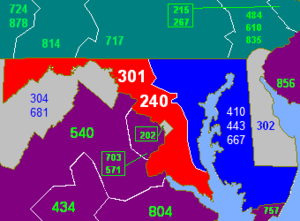Area codes 301, 240, and 227

North American area codes 240 and 301 are telephone area codes for the western half of Maryland. They serve Maryland's portion of the Greater Washington, D.C., metro area, portions of southern Maryland, and the more rural areas in the western portion of the state. This includes the communities of Cumberland, Frederick, Hagerstown, Gaithersburg, Rockville, Landover and Silver Spring.
The main area code, 301, was one of the original area codes established in 1947, and originally covered the entire state of Maryland. From 1947 to 1990, it was possible for telephone users on the Maryland side of the Washington metropolitan area to dial any number in the region with only seven digits. This was possible because the Maryland side of the metro shares a local access and transport area (LATA) with Northern Virginia, which is in area code 703, and the District itself. Every number on the Maryland and Virginia sides of the metro also existed in the District's 202, essentially using 202 for the entire metro. One consequence of this was that no central office codes could be duplicated in the D.C. area. For instance, if 202-574 was in use in the District or 703-574 was being used in Northern Virginia, the corresponding 301-574 exchange in Maryland could only be used in areas at a safe distance from the Washington metro area, such as the Eastern Shore. By the end of the 1980s, the D.C. area was running out of prefixes. To free up available numbers, the suburban use of 202 was ended in 1990.
Despite the presence of the Baltimore-Washington area, 301 remained the exclusive area code for Maryland for 44 years, making Maryland one of the largest states with a single area code. By the end of the 1980s, however, the Baltimore-Washington corridor's rapid growth made it obvious that Maryland needed a second area code. The supply of numbers was further limited by the single-LATA status of the Washington area, meaning several numbers in 703 and 202 weren't available for use. It was apparent that breaking seven-digit dialing in the Washington area would not free up enough numbers to stave off the immediate need for a new area code. Finally, Baltimore and the Eastern Shore were split off as area code 410 on October 6, 1991. The split largely followed metro area lines. However, part of Howard County, which is reckoned as part of the Baltimore area, stayed in 301 while the rest shifted to 410.[1]
This was intended as a long-term solution, but within four years 301 was close to exhaustion due to the proliferation of cell phones and pagers, especially in the Washington suburbs. To solve this problem, area code 240 was introduced on June 1, 1997, as the state's first overlay area code.[2] Overlays were a new concept at the time, and met with some resistance due to the requirement for ten-digit dialing. For this reason, conventional wisdom would have suggested a split in which the Washington suburbs would have kept 301 while Frederick and points west would have shifted to 240. However, Bell Atlantic, the state's dominant carrier, wanted to spare residents the burden of having to change their numbers.
Area code 227 is scheduled to be overlaid on 301/240 some time in the longer term to provide additional assignable numbers, although the current area codes are not expected to exhaust before 2020.
Counties served by these area codes include:
- Allegany
- Charles
- Frederick
- Garrett
- Howard (shared with 410/443/667)
- Montgomery
- Prince George's
- St. Mary's
- Washington
- A very small portion of southwestern Carroll County (shared with 410/443/667)
Local calls require 10-digit dialing (area code + number, leading "1" is not required).
Notes
- ^ "Bellcore Letter IL-90/12-049" (PDF). North American Numbering Plan Administration. Neustar. Retrieved 21 June 2013.
- ^ "Bellcore Letter IL 96/06-009" (PDF). North American Numbering Plan Administration. Neustar. Retrieved 21 June 2013.
External links
- NANPA area code map of Maryland
- List of exchanges from AreaCodeDownload.com, 301 Area Code
- List of exchanges from AreaCodeDownload.com, 240 Area Code
| North: 717, 724/878, 814 | ||
| West: 202, 304/681, 540, 571/703 | area codes 301/240 | East: 410/443/667 |
| South: 804, 304/681 | ||
| District of Columbia area codes: 202/771 | ||
| Pennsylvania area codes: 215/267/445, 412, 570/272, 610/484/835, 717/223, 724, 814/582, 878 | ||
| Virginia area codes: 276, 434, 540/826, 703/571, 757/948, 804/686 | ||
| West Virginia area codes: 304/681 | ||
